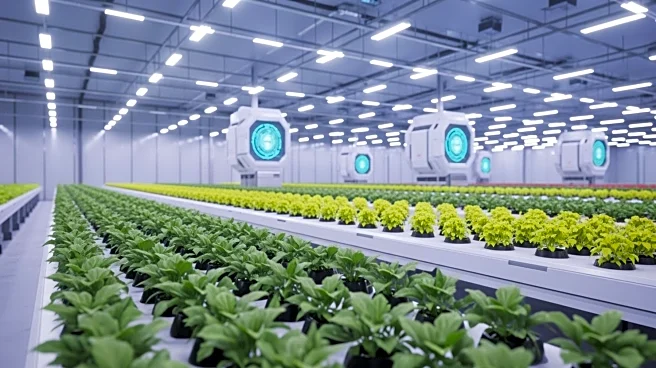What's Happening?
The University of Wyoming (UW) has initiated the Controlled Environment Agriculture (CEA) Network, a strategic program designed to enhance workforce development, research, and innovation in modern agriculture. This initiative, launched in fall 2025, aims
to strengthen Wyoming's agricultural ecosystem and advance food production technology. CEA involves cultivating crops in optimized, controlled environments, allowing for year-round growth and higher yields. The network seeks to unite industry leaders, researchers, and students to collaborate on technological advancements, research projects, and hands-on learning experiences. The Plant Growth and Phenotyping Facility at UW will serve as the central hub for testing and training, providing students with direct access to CEA systems and research-grade technology. The initiative is part of the Wyoming Innovation Partnership, a state-led effort to modernize and diversify the state's economy.
Why It's Important?
The launch of the CEA Network is significant as it addresses the growing demand for skilled professionals and innovative solutions in agricultural technology. By fostering collaboration between academia and industry, the network aims to prepare students for future jobs while advancing CEA technology. This initiative is expected to position Wyoming as a leader in agricultural innovation, attracting investment and partnerships from both domestic and international firms. The network's focus on workforce development and cross-sector collaboration is unique, potentially setting a precedent for other universities and states to follow. The involvement of early partners such as Vertical Harvest, Papa Joe's Produce, and international firms like European Photon Systems Instruments highlights the global interest in CEA and its potential impact on food production and sustainability.
What's Next?
The CEA Network is open to participation from companies, educational institutions, and other organizations interested in shaping the future of controlled environment agriculture. As the network grows, it is expected to expand its partnerships and initiatives, further integrating business perspectives into UW's research ecosystem. The collaboration with industry partners will provide valuable exposure and hands-on opportunities for students, while addressing pressing challenges in the rapidly evolving field of CEA. The enthusiasm from industry partners suggests a promising future for the network, with potential for significant advancements in infrastructure, research, and workforce development.
Beyond the Headlines
The establishment of the CEA Network may have broader implications for the agricultural sector, particularly in terms of sustainability and environmental impact. By optimizing growing conditions, CEA can reduce resource usage and minimize environmental footprint, contributing to more sustainable food production practices. Additionally, the network's emphasis on innovation and collaboration could lead to breakthroughs in agricultural technology, potentially transforming traditional farming methods and improving food security. The initiative also highlights the importance of integrating academic research with industry needs, fostering a culture of innovation that could extend beyond agriculture to other sectors.















